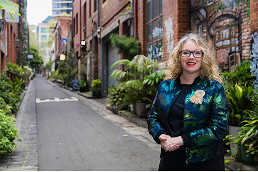A certain buzz on CBD rooftops
David Schout
Producing locally-sourced food can be tough in the concrete surrounds of the CBD, but one couple has found a unique way of cutting through.
Vanessa Kwiatkowski and Mat Lumalasi’s backyard beekeeping hobby moved into the CBD back in 2010, utilising high-rise rooftops to house their hives.
Within a year, Rooftop Honey was thriving.
Their six hives turned to 20, then to 40, leading them to ditch their jobs in IT to pursue a passion.
They now take care of 120 hives, most of which are on 30 different CBD rooftops.
“It went crazy,” Vanessa said.
“The city community was really quite accepting of what we wanted to do.”
Through building grants, hive sponsorship and – of course – selling the sweet honey, the pair has now made a living from the incredibly complex insects whose importance cannot be underestimated.
“They’re definitely smarter than humans,” Vanessa added with a smile.
“I woke up one morning and said to Mat, ‘let’s take the bees to the city’. We wanted to educate the community about the importance of bees, and the importance of bees to food, really.”
“We all get excited about honey but their main role is pollination. To create greener, more sustainable cities, bees are all a part of that.”
By pollinating plants and crops, the role of the bee is highly important to society’s food sources.
Experts claim that around one in three bites of food is influenced by bee pollination.
Bees produce honey as food storage over the colder months, and Vanessa and Mat typically extract their handiwork three times a year: in mid-spring, summer and autumn.
She said consumers enjoyed buying their product, which was as “hyperlocal” as it gets: Their CBD honey is packaged and labelled as per the location it was extracted.
For example, the honey extracted from the Emporium rooftop is labelled Lonsdale Street.
“People like buying our honey because it’s a product that’s treated with respect,” Vanessa said. “It’s not a large commercial setup. We’re not heating up honey to pump through systems to put in jars. Our methods are fairly crude and simple.”
The success of Rooftop Honey have given them the opportunity to expand into a larger business, something they considered but decided against
“We’ve decided to keep it as a small business and manage it well,” Vanessa said.
Perhaps a mark of their popularity is the 400-strong waiting list to “sponsor” their bees.
Rooftop beekeeping has occurred throughout Europe for over 100 years, especially in the big metropolitan surrounds of London and Paris.
But its prevalence in Melbourne, up until the last decade, has not been widespread.
And while that may be cause for concern for those less fond of the workaholic insects, there’s no reason to worry.
In almost all cases, bees stay at altitude until they reach their destination and are highly unlikely to hone in on passers by at street level.
Those “destinations” include Melbourne’s many gardens, which fall within its average 5km flight path.
“Melbourne’s a fortunate city – we’ve got a lot of great gardens that surround out city, and the bees do really well. We’ve never had an issue of them not finding enough food,” Vanessa said.
You can see the Lonsdale St hives in action from the upper levels of the CBD Myer building.
To find out more, visit rooftophoney.com.au

A milestone for the mysterious



 Download the Latest Edition
Download the Latest Edition